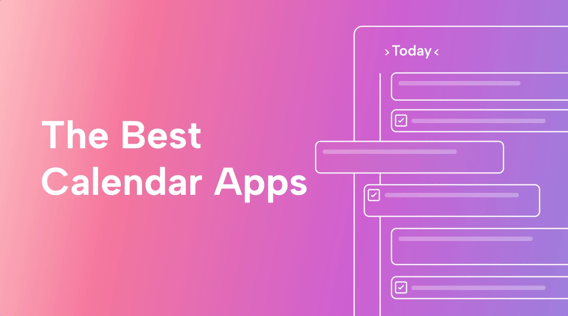Keeping track of your daily life and scheduling meetings, appointments, commitments, and tasks takes lots of time and effort. Fortunately, maximizing productivity and effortlessly managing your hectic schedule is possible with the help of a powerful calendar app.
In this article, we'll review the five best calendar apps of 2025 to help you find the calendar application to best fit your lifestyle and provide the necessary tools to manage your schedule most efficiently.
First, we’ll give an overview of our favorite online calendars. Then, we’ll shift our attention toward Motion Intelligent Calendar, the most powerful AI calendar app designed for productivity, project management, and collaborative teams. We’ll then delve into Google Calendar, Fantastical, Vimcal, and Notion Calendar, each tailored toward specific use cases.
An overview of the best calendar apps
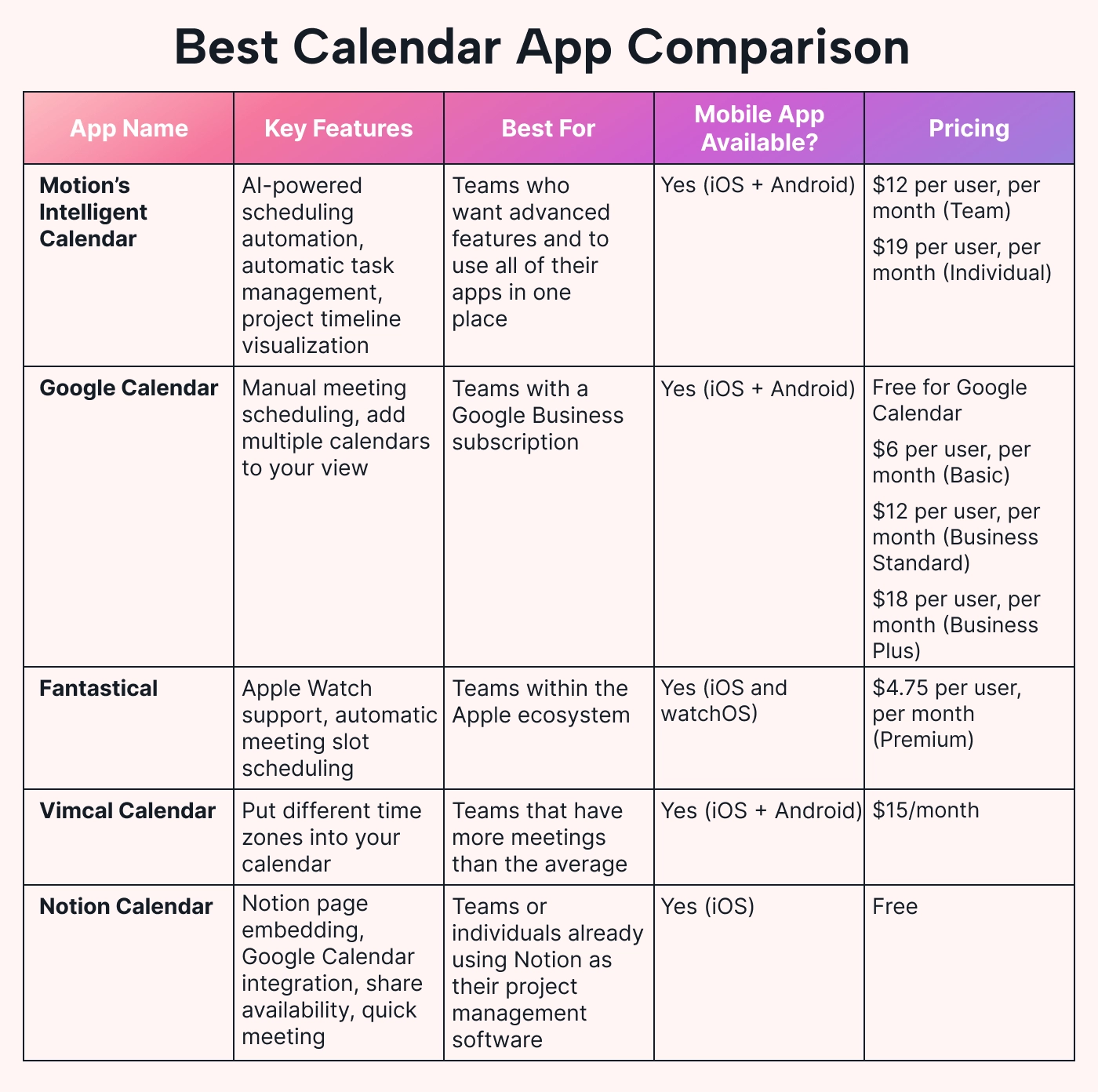
How we analyzed these calendar apps
To pick these top calendar services, we considered the needs of a knowledge worker environment. The best apps must make sharing your calendar with coworkers and booking meetings and appointments easy. Tools must also be easy to set up for the individual and the whole team or organization.
Since Motion is project management software, you can both organize your day and manage tasks without integrations. However, most online calendar app solutions don’t offer these features. The tools on this list that don’t can integrate with other project management tools, ensuring you can see a single-interface overview of your daily assignments and meetings.
Other factors that make a solid calendar include:
- Features that automatically reschedule when new, higher-priority tasks arise or alert you when you’re in danger of missing a deadline.
- The ability to sync calendars across multiple devices and platforms.
- User-friendliness (e.g., app navigation, functionality, and learning curve).
Why you need a calendar app that suits your specific needs
Powerful calendar apps can, and will, significantly improve efficiency for individuals and organizations. A smart enough calendar app will determine what you need to do next, meaning that you and your team don’t need to spend time and energy thinking about this.
Standard apps help keep track of daily and weekly events, appointments, deadlines, and tasks through scheduling. They allow you to schedule tasks in advance, manage your time for you, and display your integrated schedule.
Let’s now look at the best calendars for individual and team productivity.
1. Motion's Intelligent Calendar
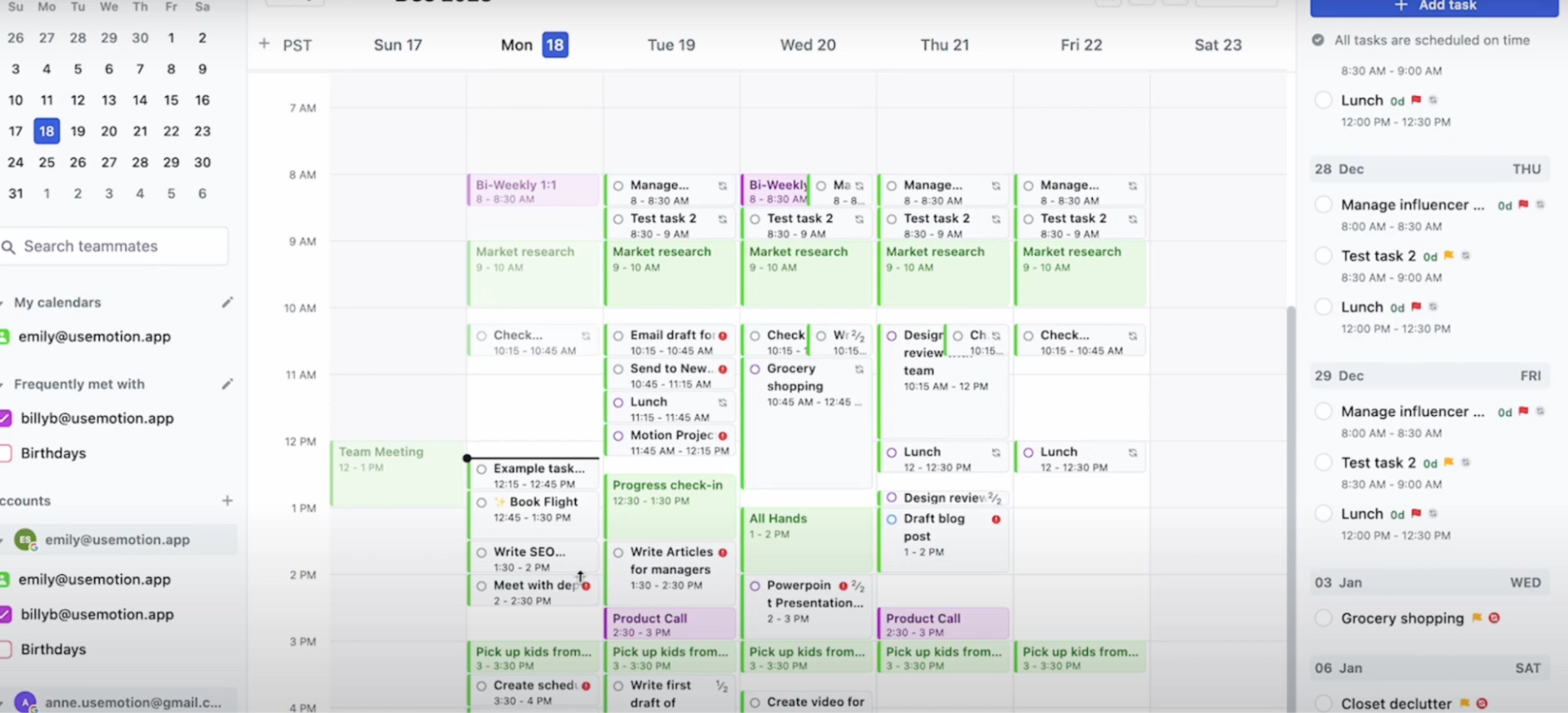
If you're looking for a powerful calendar app to help you manage your schedule, projects, and teams, Motion's Intelligent Calendar is the right choice. This app is designed to provide a productive and collaborative experience for any team that needs features for both task and event management.
What makes Motion one of the best calendar apps?
Motion users achieve more than twice as many productive hours per day as the average employee. Because Motion does it for you, you don’t waste time juggling which of the 20 (or 30) things on your plate to do next.
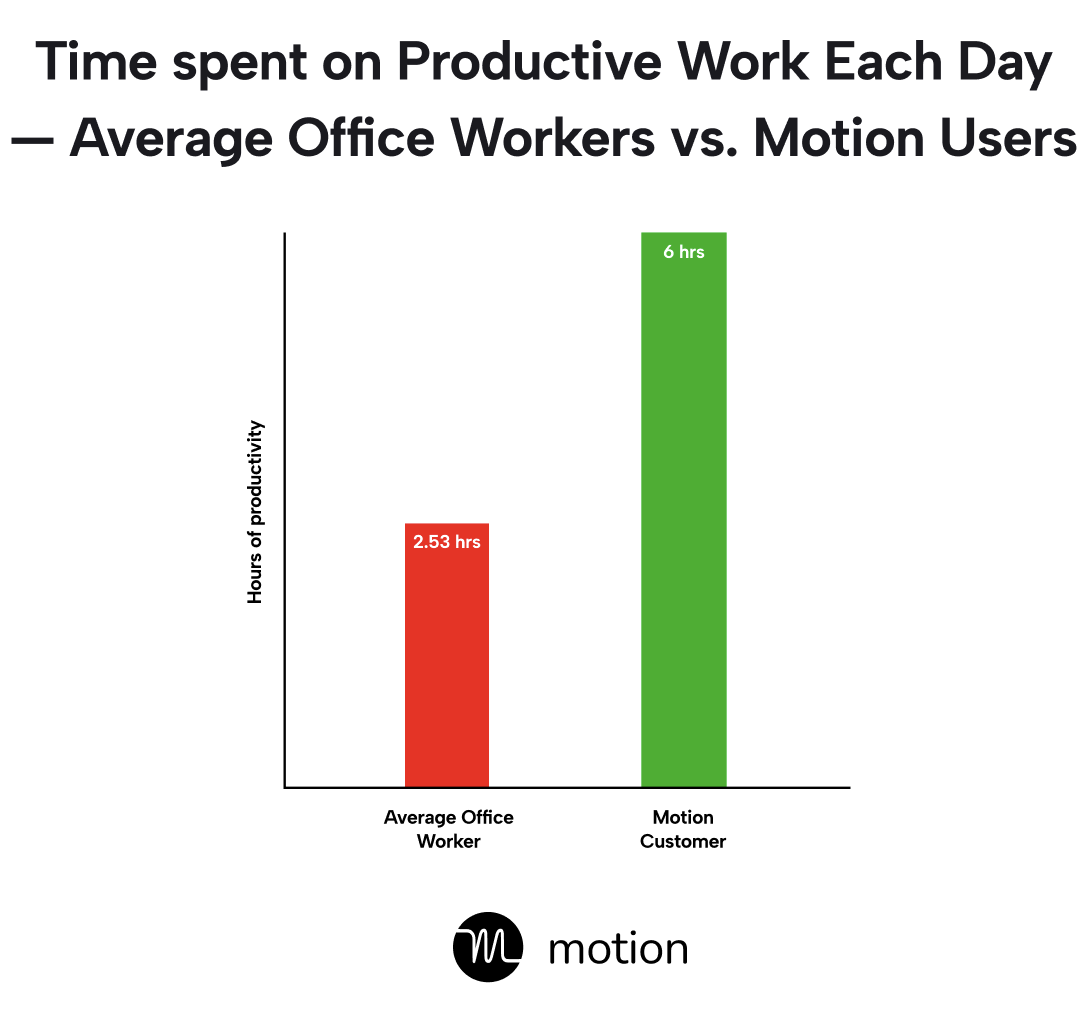
Motion automatically schedules your tasks based on available work time, priorities, deadlines, and dependencies. Once Motion has scheduled tasks, you’ll see them in time blocks on your calendar, appropriately integrated with meetings, appointments and other events.
If priorities change, or more urgent items arise, Motion will reschedule your tasks and your team’s, considering the new information. You can count on Motion to serve up the optimized schedule, and to allocate your time wisely.
It will reoptimize based on changes and alert you when you’ve asked it to do the impossible—it will tell you if it can’t meet a particular deadline.
You can track your time and let Motion know when a task is complete (or not). When tasks take more or less time than initially estimated, the built-in AI will automatically re-optimize your entire schedule. You'll never double-book or over-commit your time again. And it won’t overcommit or burn out your team, either, since it knows everyone’s available time.
Key Motion features
Since Motion is both a calendar manager and a project management tool, the Intelligent Calendar integrates project tasks and independently finds time on everyone’s schedules for meetings and appointments.
You see everything you (and your team) work on. Motion can manage your personal commitments in addition to your work schedules if you want it to.
It natively integrates with Google Calendar, Gmail, Google Meet, Microsoft Outlook, Zoom, Apple iCloud, and Siri, with Slack coming soon. Through Zapier, Motion connects with thousands of other apps, with no code required.
Other core Motion features include:
- Automatic schedule optimization when you complete or add tasks.
- Team member task allocation, along with reminder-setting and time-tracking.
- A visual timeline of your projects, tasks, and deadlines so you can see your progress and deadlines at a glance.
- Real-time collaboration features, such as comments and file sharing, to help you work with your team more efficiently.
- The option to choose between daily, weekly, monthly, and custom views.
- Eliminates the need for traditional to-do lists and traditional project management tools.
What are the drawbacks of Motion’s Intelligent Calendar?
Motion’s Intelligent Calendar has limited reporting, and is missing some features, like task color-coding. For project management, Motion has project, resource and Kanban views, but does not yet have Gantt views.
Can you sync all of your calendars with Motion?
Yes! With Motion, you can sync multiple calendars from different platforms, such as Google Calendar, Apple Calendar, and Outlook Calendar.
In fact, nearly all calendars that individuals use will be compatible and sync seamlessly with Motion, making it a great choice as a shared calendar for even the largest organizations.
Motion lets users create tasks and calendar items using voice via Siri on iOS. To use this feature, you’ll need to turn on shortcuts. Learn more about setting up this feature here.
How much does Motion cost?
Motion offers a 7-day free trial, after which you can choose from two premium plans:
- Individual plan - $19 per month
- Team plan - $12 per user per month
2. Google Calendar
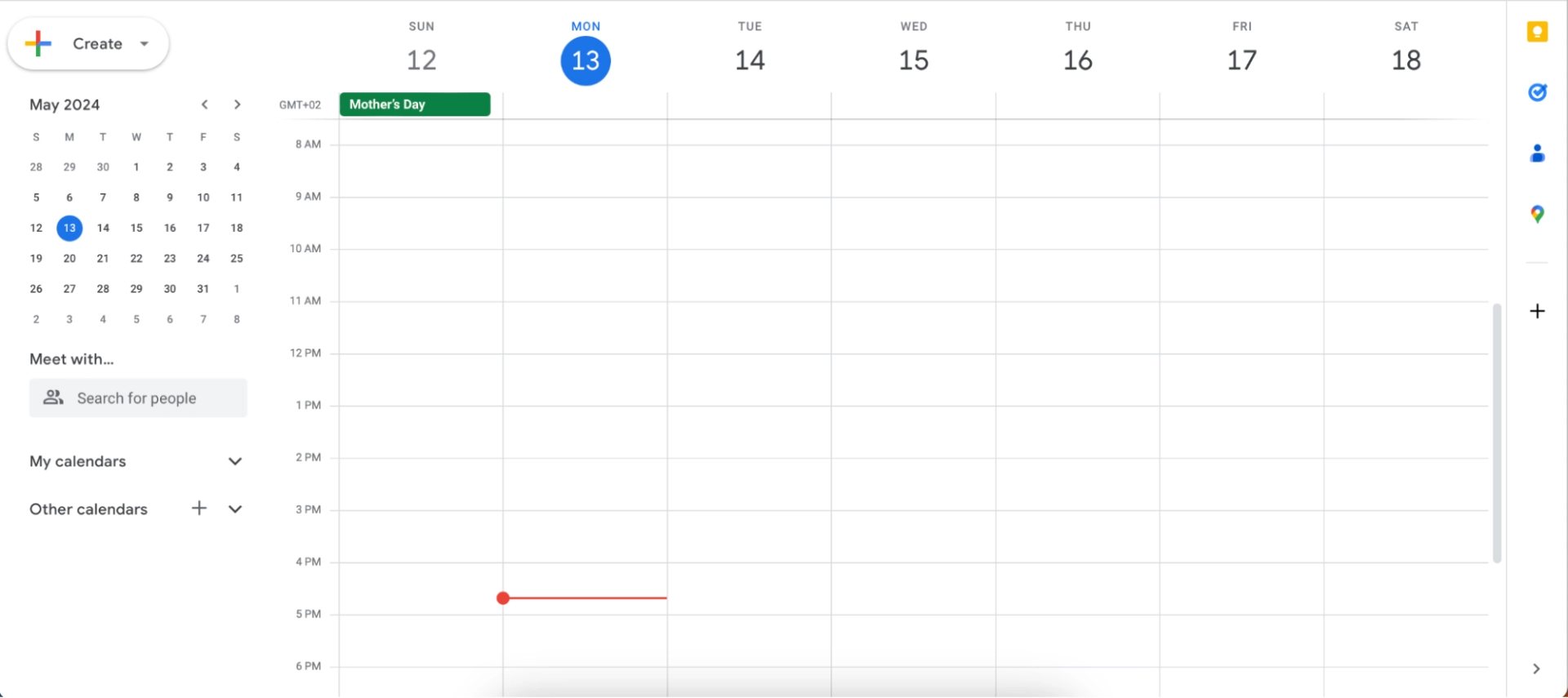
Google Calendar offers several benefits that make it ideal for average Google users. It integrates with other Google products, such as Gmail and Google Meet. This compatibility makes appointment scheduling easier and more efficient. Users can also add events from their emails or join online meetings directly within the app.
Google Calendar makes it possible to create multiple personal calendars for different purposes. This can be great for separating your professional life from your personal obligations. The app also enables shared team calendars.
Key Google Calendar features
Google Calendar lets you use color coding for clarity when customizing meetings and other time blocks from its clean user interface. You also receive an appointment scheduling page that helps others book meetings when everyone is free and avoid scheduling conflicts. So, it’s a handy tool for remote teams.
The app has a simple “My Tasks” tool that lets you manually add and check off your to-do lists. Moreover, you can mark priorities as “Starred”. Google Calendar also works with Maps, Keep, and a handful of other add-ons.
What are the benefits of Google Calendar?
While you can upgrade to a paid Google subscription, the simplest version of Google Calendar is free for everyone. So, if you have a small team and can’t afford more powerful software, the app is a good place to start.
Learning to use Google Calendar is also easy. However, you should acknowledge the manual work required to schedule tasks and to-do lists.
What are the drawbacks of Google Calendar?
Google Calendar is handy for organizing a busy life, but it might be too much of a simple calendar for some. The app lacks advanced project management and collaboration features. You have to find a project management tool with integrations to get the most out of the app and avoid app-switching. Since Motion supports Google Calendar integration, it’s worth signing up if you still want to use the app.
You also get fewer extra features than many other third-party apps. Although you can add calendars and color-code your meetings and tasks, it has fewer customization options than many of its competitors.
How much does Google Calendar cost?
Google Calendar has a personal plan available for free. For businesses, it's part of the Google Workspace suite, which offers three pricing tiers.
- Basic plan - $6 per user per month
- Business Standard - $12 per user per month
- Business Plus - $18 per user per month
3. Fantastical
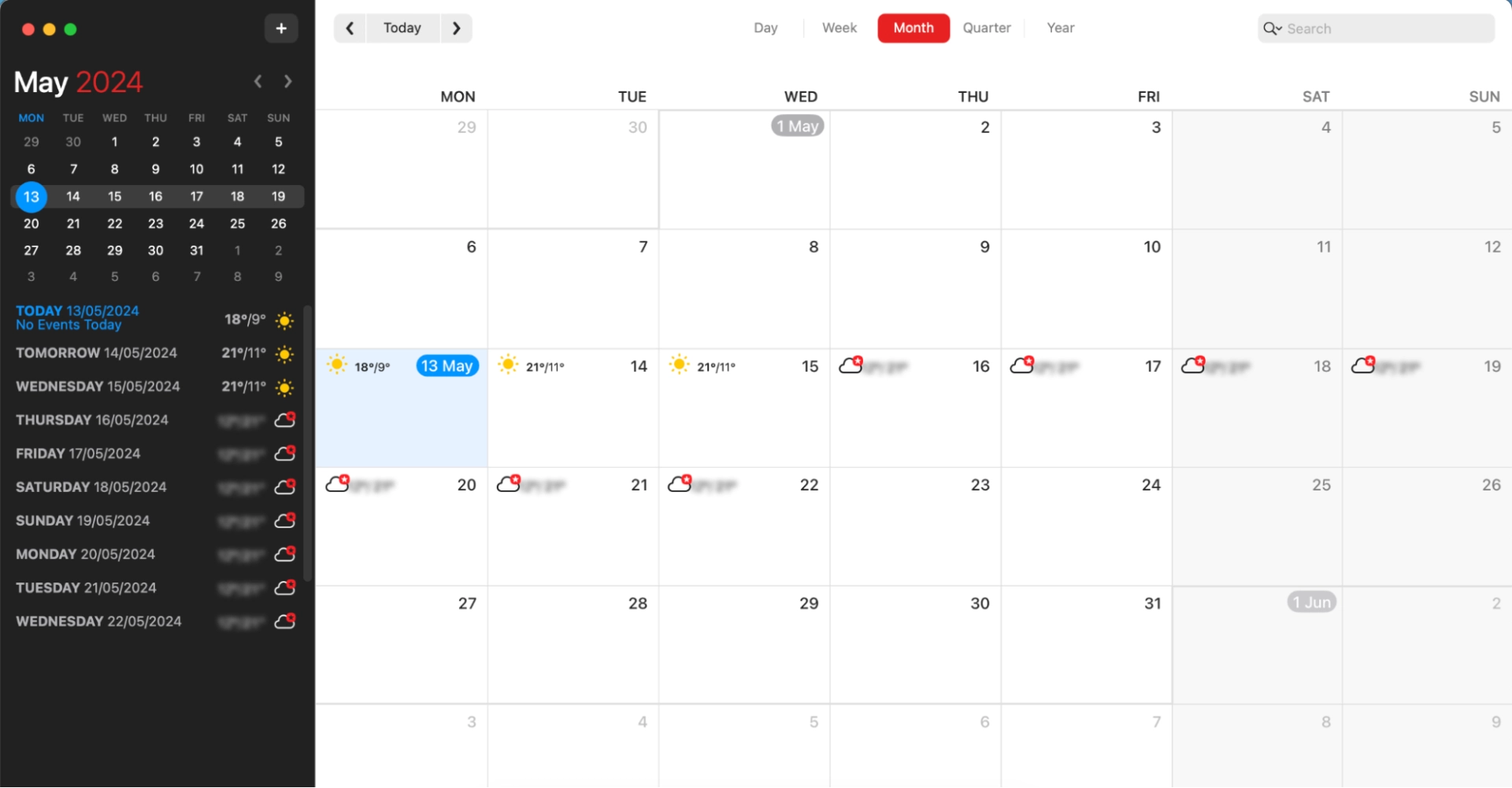
Fantastical is a well-designed calendar app exclusively for the Apple ecosystem. It is user-friendly and offers a wide range of features that cater to different personal and work needs. It can seamlessly integrate with built-in Apple apps and services such as Siri and Mail and is available for iPhone, iPad, Apple Watch, and Mac.
Key Fantastical features
Fantastical has Zoom, Google Meet, and WebEx integrations. The app also works on Apple watches, allowing you to view your daily tasks on-the-go. Fantastical lets you block out travel time and, if you need to be somewhere at a specific time, you can set up time-to-leave notifications.
You can set email reminders with Fantastical and add task lists to keep track of your most important projects. Based on your current calendar, you can automatically block meeting scheduling slots.
Another useful feature is the weather forecast integration with your calendar. This data can help when planning your day-to-day life, especially when you need to meet external clients or plan a team outing.
What are the benefits of Fantastical?
One of the fan-favorite Fantastical features is its natural language input. Users can simply type in their plans or appointments using everyday language, and Fantastical will automatically convert it into a calendar event. It also supports multiple calendars, allowing users to view and manage events from various other popular calendar applications such as Apple Calendar and Outlook Calendar.
Fantastical also implements a unique DayTicker view which shows all the events for the day in a scrollable list. This makes it easy to quickly see what's happening without switching between different calendar views.
What are the drawbacks of Fantastical?
One of the main drawbacks of Fantastical is the constraints when used for project management. As it’s only available on Apple devices, team members using Android, Windows, and other platforms cannot access Fantastical.
Hybrid teams and remote workers may also struggle to use Fantastical. You can’t view team members’ time zones, which makes resource planning and meeting schedules harder.
A final con of the Fantastical app is that the premium subscription plan's pricing structure can become quite pricey for larger teams due to the per-user fee structure, with no team licensing option.
How much does Fantastical cost?
Fantastical has a free plan. The premium version is priced at $4.75 per user per month.
4. Vimcal Calendar
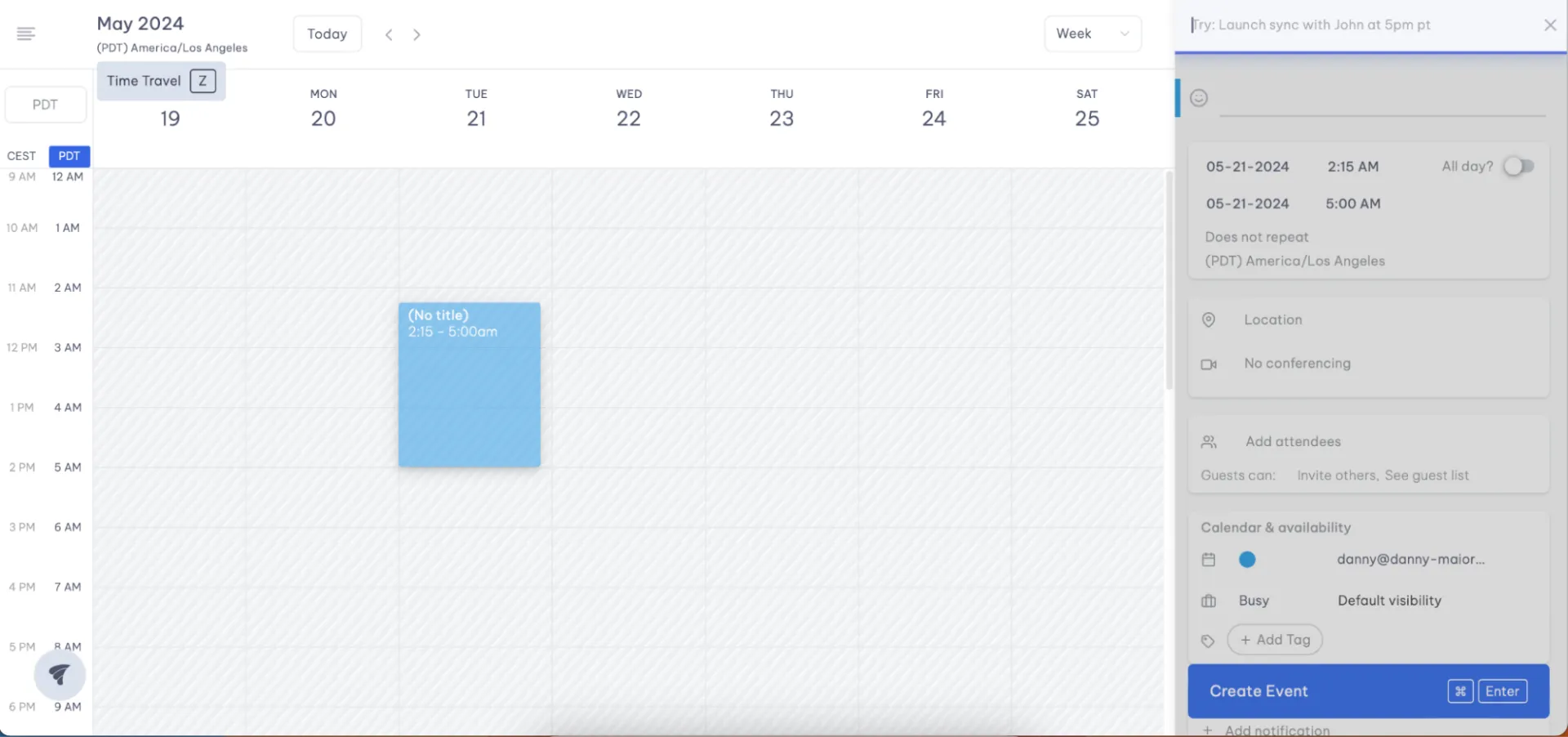
Vimcal is a new calendar app designed for users who prefer a minimalistic, customizable, clean interface without sacrificing project management and scheduling features. Vimcal is also the only calendar app explicitly built for remote work.
What are the benefits of Vimcal?
One feature which proves valuable for remote or geographically dispersed workers is the option to add cities to your calendar inputs. Vimcal will automatically manage the difficult and confusing aspect of keeping track of clients or colleagues across multiple time zones.
Another standout feature of Vimcal Calendar is its customizable, intuitive user interface. Users can choose from a variety of themes and colors to create a calendar that suits their personal style. Hotkeys and quick commands allow for efficiency without sacrificing the integrity of the app's simple visual design.
Additionally, Vimcal offers multiple views, including a month view, week view, and agenda view, which can be customized to show different types of events (such as meetings, personal appointments, or deadlines).
Vimcal also leverages a smart scheduling feature, which suggests the best times to schedule events based on the user's availability and previous behaviors.
What are the drawbacks of Vimcal?
Vimcal only integrates with Google and Microsoft Calendars. To join Vimcal, you must also connect either a Google or Microsoft account.
A major weakness of this calendar app is that Vimcal is only available on iOS, Windows, and Mac. A Vimcal Android app is currently not available.
Due to the constraints of this app's cross-platform interoperability and syncing with other calendar apps, Vimcal might not be an ideal calendar app for larger teams in 2023.
How much does Vimcal cost?
Vimcal Calendar does not serve Android users and has a free plan for iOS only. The monthly subscription fee is $15 for access to both iOS and desktop (Windows and Mac).
5. Notion Calendar
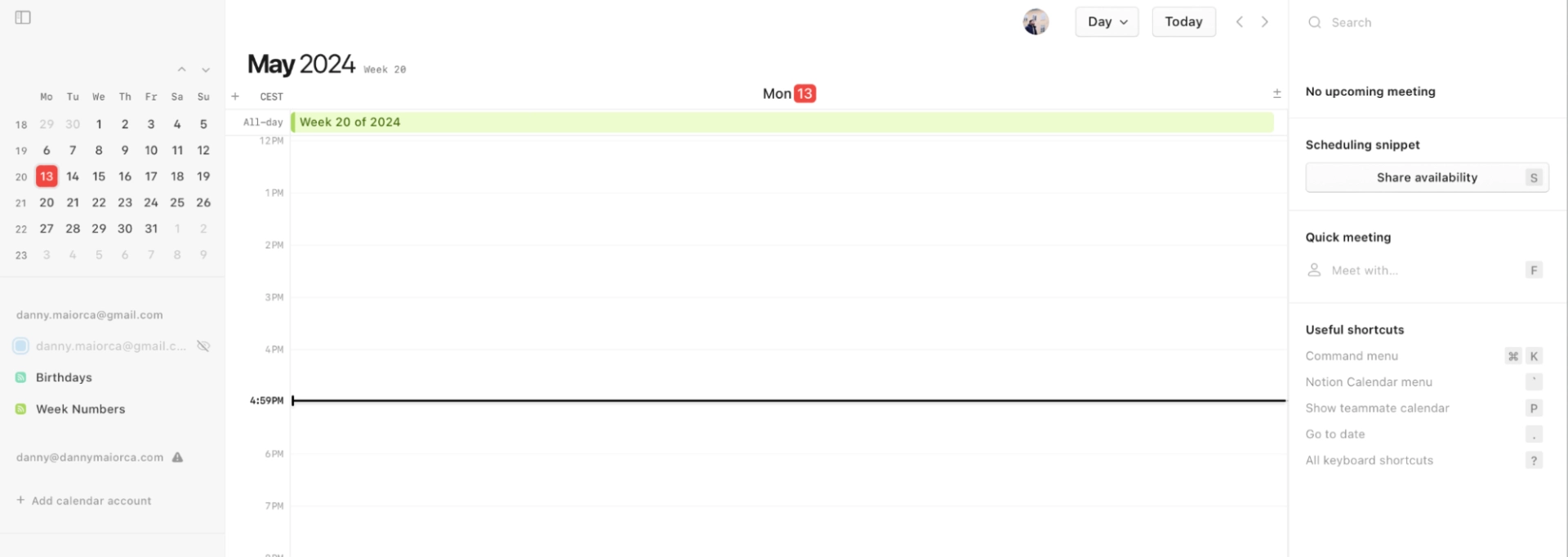
You might have heard of Notion Calendar under its previous name (Cron) – the rebranded version launched in January 2025. The app has a similar interface to Google Calendar, and you can sync your calendars from Google Calendar. Notion Calendar lets you manage daily tasks, schedule meetings, and view your team’s availability.
Key Notion Calendar features
Notion Calendar has an availability-sharing feature that lets you mark your available times within the app. Once you’ve done that, coworkers can schedule meetings and appointments at a time that suits you.
You’ll also find a “Quick meeting” tool, which offers easy access to scheduling features and lets you choose who you want to meet with. The customization features are standard, with adjustable time, date, and location fields.
Notion Calendar works with the full version of Notion (an app with note-taking and project management features like task management). You can integrate Notion pages and databases in the calendar interface.
What are the benefits of Notion Calendar?
Notion Calendar’s main advantage is that it integrates well with the Notion desktop app and Google Calendar. Notion Calendar is also easy to navigate, with a clean user interface on most devices. When using Notion Calendar, you can customize your timeline view based on the day, week, and month.
What are the drawbacks of Notion Calendar?
Unless you use a separate additional app, Notion Calendar has limited advanced features for project management. The app itself also lacks a large number of customization options, meaning that it might not scale as your team and business grow.
The Notion Calendar mobile app is only available on iOS. Because the mobile app is optimized for iPhone users, it covers limited screen space on the iPad.
Another drawback is that Notion Calendar is a separate app from Notion, and you need both of them to get the most out of the service. If you don’t like switching between multiple apps, this could be a deal-breaker.
How much does Notion Calendar cost?
Notion Calendar is free to download and use, but to use it with Notion, you may need a premium subscription for the Notion app.
- Notion Plus costs $8 per user, per month.
- Notion Business costs $15 per user, per month.
- Notion Enterprise has custom pricing.
Find out for yourself how Motion does it all
A calendar app is a must-have and easy-to-access tool for anyone wanting to save time, improve daily productivity, and efficiently manage busy work and personal schedules. Choosing the calendar application best tailored to your needs is essential to get the most out of this technology.
While each app has strengths and weaknesses, Motion is the most powerful calendar app to improve productivity while managing projects and teams. Its state-of-the-art artificial intelligence and machine learning algorithms automate the scheduling process, helping significantly increase productive hours.
In addition to this, the Motion Intelligent Calendar is extremely user-friendly and easy to learn. It provides real-time collaboration tools and automation features, all while allowing users to sync each of their calendars across different platforms and devices.
To experience the benefits of 2025’s most powerful calendar app, start your 7-day free trial of Motion today!

Hailing from South Africa, Richard Reynolds is a seasoned project & product management writer at large (last sighted in Vietnam!) With 5+ years experience in the field, a BA in Psychology, and education in Biz Mgmt & Professional Project Management, Richard remains passionate about simplifying complex project concepts with seasoned professionals and newbies alike.
